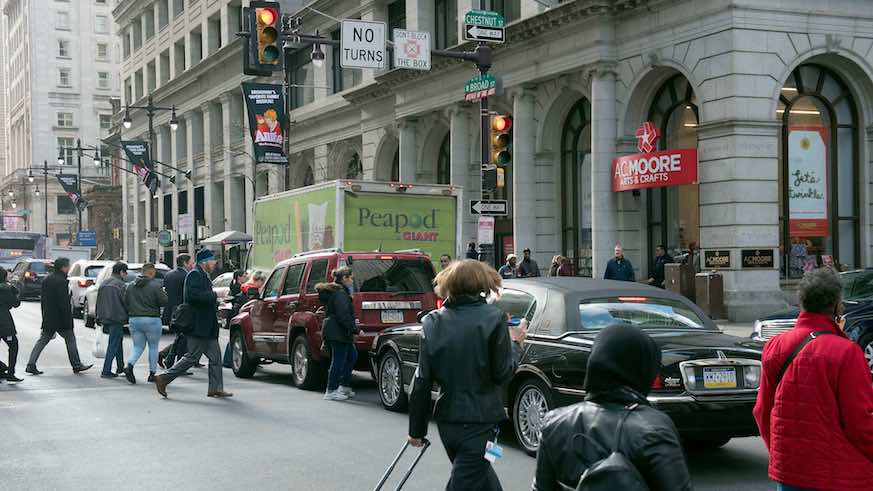Center City has become steadily more crowded in the last several years. It’s not hard to see why. Philly’s population growing for the first time in decades; take the new troops of millennials employed downtown, add in Uber, Lyft, bicyclists and new bike lanes, and don’t forget the bewildering number of people who reject the convenience of public transportation to drive a car into the city, and you get traffic patterns in Center City suddenly moving slower than ever.
RELATED: Kenney will ‘pilot’ more bike lanes in Center City arteries
Two ideas to address the issue were publicized by city officials on Thursday.
First up is a planned crackdown on moving violations – like blocking the box, double-parking, or illegal parking in bus lanes, which can have a cumulative effect backing up traffic for blocks – will go into effect Sept. 24.
“People need to get to where they are going – to work, to school, to see their loved ones – and not worry about getting stuck in traffic. It’s that simple,” said Mayor Jim Kenney on Thursday, announcing a crackdown specifically on Market and Chestnut streets, in collaboration with SEPTA and the Philadelphia Parking Authority (PPA).
Philadelphia has grown by 50,000 residents and jobs since 2010, Kenney’s office said, and they asserted that Center City is the second most dense downtown in any city in the country, just behind midtown Manhattan.
RELATED: Lincoln Drive announces new road closures for $12 million renovation
As part of the crackdown, SEPTA and PPA officials will be stepping up efforts to prevent activities like stopping, standing, loading, or driving through an intersection from bus-only/right-turn lanes along Chestnut and Market streets.
SEPTA supervisors have already been providing warnings for weeks to drivers violating these rules and negatively influencing traffic patterns. Starting Sept. 24, enforcement will commence, focused on Market between 7th and 13th streets and on Chestnut between 22nd and 10th streets.
“Our goal is not to issue tickets, but rather deter if not stop unsafe behavior and eliminate congestion from our streets,” PPA Executive Director Scott Petri said in a statement.

Another possible solution to Center City congestion
Meanwhile, also on Thursday, City Council President Darrell Clarke proposed an amendment to create a new class of civil service employee, “Public Safety Officers,” to help enforce moving violations throughout Center City year-round.
No matter how you get around — whether by motor, wheel, or foot — you probably witness at least one traffic violation a day,” City Council President Darrell Clarke said in a statement. “We could have the toughest laws in the country on the books – but what good does it do if we don’t have appropriate enforcement? Not only will putting more eyes on the street encourage everyone who moves through our city to follow the rules, I believe it will free up critical police resources that can be directed to more serious crimes.”
RELATED: Kenney to Philly: Let’s end traffic-related deaths by 2030
According to the amendment to the Philadelphia Home Rule Charter Clarke proposed on Thursday, these officers would not carry a gun or be empowered to make any arrests. Their duties would relate to “providing support to the Police Department to regulate the flow of traffic and support special events; providing such other assistance as uniformed police officers may require to enforce quality of life crimes; enforcing municipal code violations relating to the quality of life in the City’s neighborhoods,” according to the text of the amendment.
The dueling proposals seemed to be yet another example of the occasional disconnect between City Council and the Mayor’s office, with Kenney implicitly rejecting Clarke’s proposal. (The FOP has also criticized the idea, saying only sworn police officers could handle these types of duties).
“We don’t need any new legislation, we are just enforcing laws already on the books,” Kenney said in his announcement of the crackdown.
If Clarke’s proposal wins approval from two-thirds of City Council members, it will will go before the public as a ballot question in May 2019, and if passed, the first Public Safety Officers could start hitting the streets six months later.



























